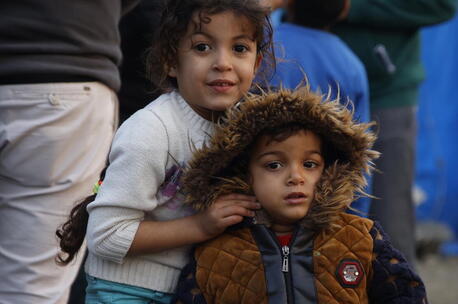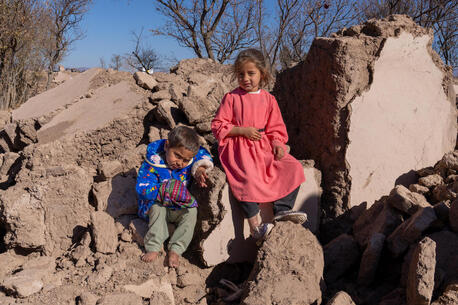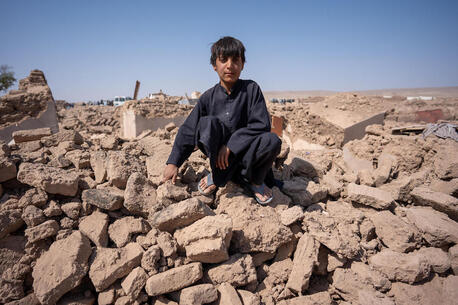
In Syria, UNICEF Mobile Clinics Reach Children After Earthquakes
UNICEF health and nutrition teams are providing urgently needed care for children in the aftermath of the catastrophic Feb. 6 earthquakes.
Nearly 42 ,000 are dead and tens of thousands injured after twin earthquakes devastated Turkey and Syria on Feb. 6, 2023. As the search and rescue phase winds down, the scale-up of the humanitarian response is accelerating rapidly. UNICEF teams are on the ground in both countries, working with partners to reach children and families with lifesaving assistance.
In the city of Aleppo in northern Syria, UNICEF-supported mobile clinics are providing children with health consultations, free prescriptions, medical referrals and other specialized medical services. UNICEF health teams also screen children under 5 and pregnant women for malnutrition and distribute nutrition supplements.

The mobile health and nutrition teams make the rounds, visiting four or five shelters each. Worried parents line up to wait their turn with their children in their arms.

Indelible memories of sudden disaster
Ahmad brought his 2-year-old daughter, Amirah, to be screened for malnutrition at a mobile clinic in Aleppo's Alsaheen neighborhood.
"It was indescribable," he said, flashing back to the instant he was jolted awake by the first earthquake at 4:15 a.m. "I grabbed the children, and we immediately left our home." Their building was badly damaged, so the family is staying at his sister's house for the time being.

A terrifying escape
At an emergency shelter in a mosque in the Sleiman Alhalabi neighborhood of Aleppo, Yasmine, a mother of two, described the first moments of the earthquake, as she fled with 6-year-old Faten and 13-year-old Abdulkhaleq.
"I heard the walls of the apartment on the floor above us crumble, so we rushed out. I saw death with my own eyes. When I held my children's hands down the staircase, my legs were shaking. I remember the building smelled like mold. Apartments were flooding and others were collapsing.
"We didn't have time to grab any of our stuff, so we came here," Yvonne continued. "My sister-in-law brought us three blankets to keep us warm here. I hope we can go back home soon."

Dedicated UNICEF health workers are determined to reach every child in need
The families at the shelter "are going through very tough times," said Faiza, 26, a UNICEF-supported health educator. "They are very anxious, but we're trying to support them as much as possible."
"I'm saddened the most to see displaced children in lightweight clothing, despite the cold," Faiza continued. "They escaped with nothing but the clothes on their backs. Pregnant and lactating women are also vulnerable in these conditions. Seeing my baby, Wateen, in good health is what's helping me cope after what happened. It keeps me motivated to support other children and mothers."

Nearby, Hanan waited for a health consultation for her children: Molham, 7, Hala, 4, and Nour, 13. "I was displaced before more than once, because of the conflict," Hanan said. "I'm really tired, but thankful my family is safe."

Children suffer first and suffer most in emergencies
In Alsaheen, Hiba, a mobile health team leader, screened Sondos, 2, for malnutrition using a mid-upper arm circumference (MUAC) tape. The measuring tape's reading was yellow, a warning that Sondos is at risk of acute malnutrition. A reading in red indicates that a child is suffering from severe wasting, the most visible and life-threatening form of malnutrition, and must be referred to a nutrition facility for treatment.

Families and children devastated by the quakes need urgent support now
Just a few hours after the earthquake hit, Hiba left her two children, 6-year-old Jad and 8-year-old Spinta, at home with her husband and rushed to meet with her team to begin supporting children impacted by the quake. "Feeling incapable to do much is the hardest thing," she said. "I'm responsible for keeping my little ones safe and I felt equally responsible to help other children in need.
"To support my team members, I must manage how I feel and stay in good spirits despite everything. It’s not easy! We have lost a member of our team. May her soul rest in peace. And a couple of our team members lost their homes," Hiba added.
“During these past few days, when I go to sleep, I feel that I’m never sure what tomorrow will bring. Uncertainty is everywhere, but we keep going to support the people who need us.”
Help UNICEF reach more children affected by the earthquakes in Syria and Turkey. Your contribution can make a difference. Donate today.
HOW TO HELP
There are many ways to make a difference
War, famine, poverty, natural disasters — threats to the world's children keep coming. But UNICEF won't stop working to keep children healthy and safe.
UNICEF works in over 190 countries and territories — more places than any other children's organization. UNICEF has the world's largest humanitarian warehouse and, when disaster strikes, can get supplies almost anywhere within 72 hours. Constantly innovating, always advocating for a better world for children, UNICEF works to ensure that every child can grow up healthy, educated, protected and respected.
Would you like to help give all children the opportunity to reach their full potential? There are many ways to get involved.





